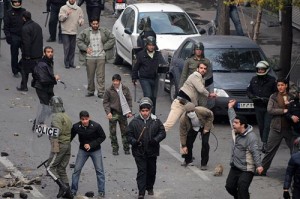As Student Protests Continue, State Foments Civil Strife
Newspaper under control of Leader’s brother closed for its reports
(9 December 2009) As Iranian students vow to continue protests, Iranian authorities are stoking the flames of civil strife by pitting pro-government Basiji militiamen against students who are demanding reform, a policy that could ignite into a wider conflict, the International Campaign for Human Rights in Iran reported today. The Campaign is also deeply concerned that over 130 students who are still detained following demonstrations may be ill-treated and tortured in prison.
“The authorities of the Islamic Republic are inflicting violence upon students and other citizens by instrumentalizing young Basiji militia, who are in effect child soldiers,” stated Hadi Ghaemi, spokesperson for the Campaign.
“The policy appears to be one of using student protests to generate chaos that will neutralize critics and prop up the government,” he added.
According to official sources, 165 males and 39 females were arrested and referred to judicial institutions. As reported by the official ILNA news agency, 86 were released after expressing regrets to judicial authorities, some of which were presumably forced.
The Campaign reminds that several students died in detention following their torture and mistreatment in detention after demonstrations on 9 July in commemoration of student protests in 1999.
Majid Tavakoli, a student of Amirkabir University who was arrested in 2006 and spent 15 months in prison, and who was again arrested in July 2009 and released after 3 months, was arrested after he gave a speech to the gathering of students at the university and wanted to leave the campus. Fars News Agency, sponsored by the Revolutionary Guards, reported on 7 December that “Majid Tavakli as a leader of rebellion was arrested,” and noted that Majid had insulted Islam before.
Kamran Asa, brother of Kianush Asa, a student in Elm o Sanat University who was killed at a the demonstration on 15 June in Tehran, spoke to students gathering at the university and was arrested along with Bijan Rezaie while they were leaving the university. Recently, Kamran and his mother sent a letter to the Judiciary and requested accountability for Kianush’s death.
Detention of well- known students continued, as for example Sohrab Karimi, a Kurdish students activist, was arrested at his hometown of Ghorveh. He had been arrested previously on National Student Day in 2007, and in April 2009.
In other developments, an independent Iranian newspaper, Hayat e Now, was ordered to be closed because it briefly reported on activities by Basiji militiamen during National Student Day (7 December) demonstrations. Hayat e Now, a daily newspaper, is among the few independent news media still operating in the Islamic Republic. The Supervision Board on Media has referred the newspaper to the Judiciary for allegedly reporting on too many political issues.
The legal owner of the publication, under whose name it is licensed, is Hadi Khameni, brother of Iran’s Leader.
The publication announced that a photographer on its staff was beaten by security agents despite having shown his press permission.
The text of the newspaper’s report included a summary of events on 7 December: the extent of protests, detentions, and the use of Basij and plain-clothes forces to confront students, which the authorities have been attempting to keep out f the eye of the Iranian public.
In the demonstration on 8 December at Tehran University, Basiji militia again forced students into buildings and, according to eye witnesses who reported to the Campaign, the Basiji and plainclothes agents broke the glass of doors and windows and attacked the students in the Engineering Building. An eyewitness reported that they carried Colt pistols.
The International Campaign for Human Rights in Iran appealed to the Islamic Republic authorities to end violent repression against demonstrators, and to cease the use of Basiji militia to instigate dangerous confrontations among citizens.







